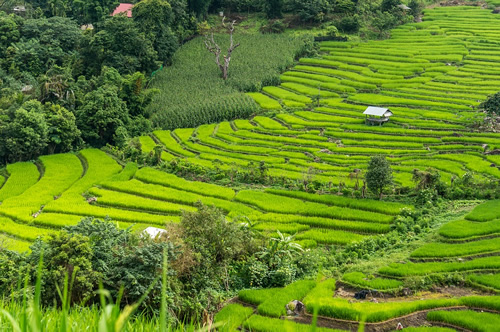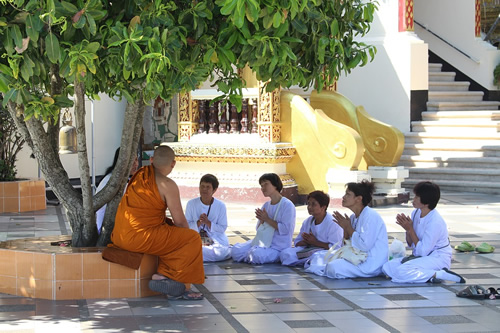Living in Chiang Mai, Thailand as an Expatriate
Views from the Elephant’s Eye
By Sara Avant Stover
If you imagine Thailand to be an elephant’s head in profile, the southern peninsula being the trunk,” someone once told me, “then Chiang Mai is right where the eye would be.” And within that eye dwells much wisdom and cultural appeal. Since 1296, Chiang Mai has built over 300 temples as well as some of the country’s best universities. Modernization has not diminished the charm of a metropolis of over 1.2 million people, with over 200,000 people living inside the city center surrounded by an ancient walled moat.
Enticed by Chiang Mai’s seemingly inexhaustible work and leisure opportunities, tourists often become either permanent residents or repeat visitors. You find them watching French films at the Alliance Francais, weaving through traffic on motorbikes, huddling around pitchers of beer during The Irish Pub’s weekly “Quiz Night,” or bartering for a kilo of tomatoes at a local market. They are teachers, volunteers, students, missionaries, business owners, and retirees. Regardless of their occupations or nationalities, all find the slow pace of Chiang Mai living enticing.
Expatriate Profiles in Chiang Mai
52-year-old Margaret Bhadungzong has made this northern Thai city her home since 1973 when she arrived in Bangkok with her Thai husband, Goson, whom she met while at college in Ohio. After living in Bangkok for five years with their child, “Bangkok got to be too frenetic and hectic” and they decided to move to Chiang Mai to start a now-flourishing tourist magazine, Good Morning Chiang Mai. Looking ahead, she feels that retirement in Chiang Mai will mean a “very happy life.”
Don Wilcox arrived in Thailand 19 years ago and found that Chiang Mai reminded him of his home in North Carolina: “I love the city. It feels very much like Appalachia.” Shortly after his arrival, Don married a Thai woman crippled with polio and the two have since started Chiang Mai’s first and only disabled center. (“We’re not a popular cause,” he says, “we’re a lost cause.” “We’re people that no one wants to see.”)
Today the Center — which provides internet access, bike rental, and massage services — works with many foreigners who come to volunteer.
Wilcox advises potential visitors: “Leave personal baggage at home. Leave cultural assumptions behind you and become vulnerable to another perspective. Don’t ask, ‘Can I drink this water? Are there chilies in this rice?’ Dive in. Exercise reasonable caution. Get over ‘us and them.’”
 |
| Rice fields not far from Chiang Mai. |
Eight years ago, 47-year-old Julia Jus, then a single mother, followed her inner voice to Chiang Mai. Since then she has raised her two children, remarried, and started Cynergy, an enterprise which includes homeopathic consultations and a 7-day “rejuvenation” retreat. Although her business has been a success, attracting clients ranging from Indian royalty to Hollywood stars, running a business outside of her native culture has been a challenge. Thais, she finds, generally operate according to a very different work ethic than that to which she is accustomed: the “Mai Pen Rai” attitude (a ubiquitous Thai phrase meaning “never mind”) is not always conducive to serving Western clients efficiently.
Despite the low costs of living in Chiang Mai, Jus, who feels “this is a great place to raise kids,” made sure that she had adequate savings before moving her family here and beginning her business. “If you don’t have any income,” she warns potential newcomers, “coming here and looking for a way to support yourself is very difficult.”
Karin Madison moved to Chiang Mai from Cleveland two years ago with her husband, Brent, a photographer, after she had worked in Japan as an ESL teacher. Karin explains: “It’s way cheaper to get started here. We traced the trend, the next hotspot for travel and photojournalism.”
Extensive Web research, networking with family friends, and some savings made their transition a successful one.
If you’re single and you know what kind of job you want, it’s not difficult to move to Chiang Mai,” Karin advises. “You need to be resourceful and proactive. Check out, especially on the internet, various resources on the place where you want to move.”
Americans not only come to Chiang Mai to teach or to start their own businesses. They also decide to study at one of the universities, volunteer at NGOs, or even retire here. Mark Isenstadt, a 32-year-old former social worker from Colorado Springs, moved to Chiang Mai to pursue a course in parisitology at Chiang Mai Univ. Like Karin, Mark’s relocation preparations began with Web research.
Although the cost of education is much lower here than in the U.S., and both his studies and the country help to “spark his interest,” he, too, feels frustrated with Thailand’s “Mai Pen Rai” outlook. “You have to adjust yourself to a different pace here,” Mark explains. Nevertheless, the good outweighs the bad. He now pm.lans on pursuing a Masters in International Health at CMU and has fallen in love with a Thai woman. Mark also volunteers once or twice a week at Rejoice Urban Development Project (RUDP), a local NGO AIDS charity which provides medical, monetary, and emotional support to HIV victims and their families.
David Spillane, a 62-year-old retiree from New Haven, Connecticut, first visited Thailand in 1965 on a break from his service in Vietnam. He has worked at the U.S. Embassy in Bangkok, at the American Consulate in Chiang Mai, and he has married a Thai women, with whom he now lives in Chiang Mai at the foot of Doi Suthep.
“The City has changed markedly since then,” he explains. “Twenty-five years ago it was really a sleepy little city.” And although pollution and traffic have accompanied recent growth, David is not alone in that he has chosen to enjoy his retirement in Chiang Mai for its temperate climate and “reasonably slow” tempo. He finds that in America “everyone seems wired, but here it doesn’t have quite the tension levels.”
Westerners who crave efficiency “may find Chiang Mai slightly disappointing,” he says. But the cultural environment supports his interest in Buddhist studies; he frequently walks over to the nearby Wat Umong for the Sunday “Dhamma talks,” given by an English monk.
“Buddhism permeates the culture in so many ways,” Dave says, “I realized what a major influence it is on the whole Thai culture and how they perceive things and how they interact . . . from the King on down.”
 |
| Monks at a Buddhist complex. |
Whether you’re thinking of a journey into the eye of Thailand’s elephant to start a business, teach, study, or just “be,” the first thing to do is to come see it for yourself.
SARA AVANT STOVER teaches English literature and dance in Chiang Mai.
|
